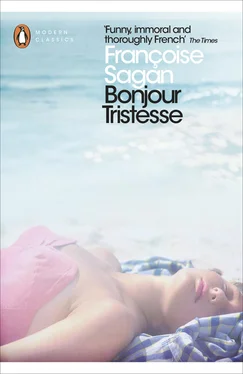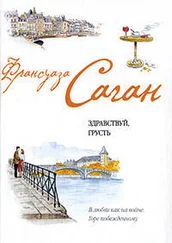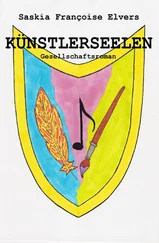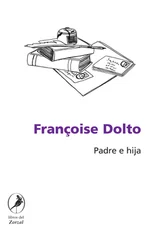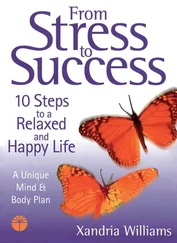I wasn’t listening. The idea of those two characters, my father and Elsa, embracing in the shadow of the pines seemed to me farcical and devoid of reality, I couldn’t visualize it. The only vivid thing from that day, and cruelly vivid at that, was Anne’s face as I had last seen it, with grief written on it, the face of a person who has been betrayed. I took a cigarette from my father’s packet and lit it. That was another thing that Anne would not tolerate, smoking during meals. I smiled at my father:
‘I understand fully: it’s not your fault. It was a moment of madness, as they say. But Anne will just have to forgive us, what I mean is, she’ll have to forgive you .’
‘What’s to be done?’ he asked.
He looked dreadful. I was sorry for him and for myself as well. Why was Anne abandoning us like this, why was she making us suffer for what amounted to nothing more than an indiscretion? Was she under no obligation to us?
‘We’ll write to her,’ I said, ‘and ask her forgiveness.’
‘What a brilliant idea!’ my father cried, at last finding a way out of the state of remorseful inactivity in which we had been wallowing for the past three hours.
Without waiting to finish our meal we pushed back the tablecloth and what was on it, my father went to fetch a big lamp, pen and ink and his writing paper and we settled down opposite each other. The gracious scene thus created seemed so likely to bring about Anne’s return that we were almost cheerful. A bat came and traced silken curves outside the window. My father bent his head and began to write.
I cannot recall without an unendurable awareness of mockery and cruelty the letters overflowing with kind sentiments that we penned to Anne that evening, the two of us sitting in the lamplight like two diligent, clumsy schoolchildren working away in silence at that impossible task of ‘getting Anne back’. But we produced two masterpieces of their kind, full of good excuses, affection and repentance. By the time I had finished, I was more or less persuaded that Anne would be unable to resist them and that a reconciliation was imminent. I could already envisage the scene of forgiveness, full of delicacy and humour … It would take place in our drawing room in Paris, Anne would come in and …
The phone rang. It was ten o’clock. We exchanged glances, at first astonished and then full of hope: it must be Anne, phoning to say that she forgave us and that she was coming back. My father leapt to the phone and shouted down it a joyful ‘Hello’.
Then, in a voice almost too low to be heard, he just said, ‘Yes, yes. Where is that? Yes.’
It was my turn to stand up; I was becoming fearful. I watched my father as he passed his hand over his face in an automatic gesture. At length he gently put the receiver back and turned to face me.
‘She has had an accident,’ he said. ‘It happened on the Route de l’Esterel. 13It took them some time to discover her address. They phoned Paris and were given our number here.’
He was speaking in a monotonous, mechanical way and I did not dare interrupt.
‘The accident happened at the most dangerous spot. There have been a lot of accidents at that particular spot, it seems. The car fell fifty metres. It would have been a miracle if she had escaped.’
I remember the rest of that night as if it had been a bad dream: the road coming up to meet our headlights, my father’s face set rigidly, the door of the clinic … My father did not want me to see her. I sat on a bench in the waiting-room staring at a framed print of Venice. My mind was a blank. A nurse told me that it was the sixth accident at that spot since the beginning of the summer. My father still did not come back.
Then it struck me that, in the manner of her death, Anne had once again marked herself out as different from us. If we had committed suicide, my father or I – always assuming that we would have had the courage to do so – it would have been with a bullet in the head and we would have left behind an explanatory note designed to be permanently unsettling to those responsible and to trouble their sleep. But Anne had bestowed on us a magnificent gift by making it entirely possible for us to believe in an accident, given the dangerous spot and the instability of her car. It was a gift that before long we would be weak enough to accept. And, in any case, if I now refer to it as suicide, I’m taking rather a romantic view of it. Would anybody be likely to commit suicide on account of creatures like my father and myself who have need of no one, either living or dead? Be that as it may, my father and I have only ever spoken of it as an accident.
We returned to the house the next day at around three o’clock in the afternoon. Elsa and Cyril were waiting for us there, sitting on the steps. To us they were just two drab, forgotten characters, neither of whom had really known Anne or loved her. There they were with their petty little love stories and the two things that gave them any appeal, their good looks and their discomfiture. Cyril came up to me and laid his hand on my arm. I looked at him: I had never loved him. I had found him kind and attractive; I had loved the pleasure he gave me; but I did not need him.
I was going away, leaving behind me that house, that boy and that summer. My father was with me. It was he now who took my arm as we went into the house.
Inside were Anne’s jacket, her flowers, her room, her scent. My father closed the shutters, took a bottle from the fridge and fetched two glasses. It was the only remedy we could aspire to. Our letters of apology were still spread over the table. I pushed them aside and they fluttered on to the parquet. My father, coming towards me with a full glass, hesitated, then avoided stepping on them. I found all that symbolic and in poor taste. I took my glass in both hands and drained it in one gulp. The room was in semi-darkness. I could see my father silhouetted against the window. The sea was beating on the shore.
Twelve
The funeral took place in Paris, in fine sunshine, with a crowd of curious onlookers and much black. My father and I shook hands with Anne’s elderly relatives. I looked at these ladies inquisitively: they would most likely have come to our house to take tea with us once a year. People looked at my father with sympathy: Webb must have spread the news about his planned marriage. I caught sight of Cyril looking for me on the way out. I avoided him. The resentment I harboured against him was completely unjustified but I couldn’t help it. People around us deplored the dreadful, senseless thing that had happened and, as I had still some doubts as to whether the death had been an accident, I was glad about that.
On the way back in the car my father took my hand and held it tight in his. I thought: ‘I am all that you have left and you are all that I have left, we are alone in our unhappiness,’ and for the first time I wept. It was not unpleasant to shed tears. It was quite unlike that emptiness, that terrible emptiness I had felt in the clinic while looking at the print of Venice. My father offered me his handkerchief, wordlessly, his face ravaged by grief.
For a month the two of us lived as widower and orphan-girl, taking all our meals together and not going out. We sometimes spoke a little of Anne: ‘Remember that day when …’ We spoke about her cautiously and without looking at each other, for fear of causing ourselves hurt or lest something be triggered in one or other of us that might result in something irreparable being said. Our wariness and our consideration for each other had their reward. We were soon able to talk about Anne in a normal way, speaking of her as of someone dear to us with whom we would have been happy but whom God had called to Himself. I am writing ‘God’ instead of ‘chance’, but we did not believe in God. We were fortunate enough in the circumstances to be able to believe in chance.
Читать дальше
